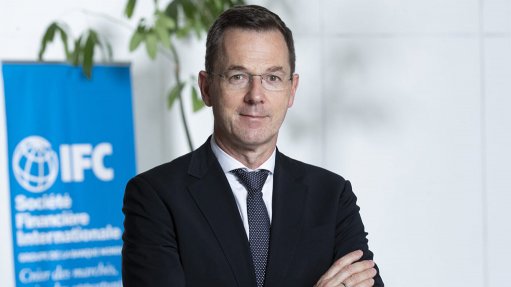
IFC VP for Africa Sérgio Pimenta
The World Bank’s private sector financier, the International Finance Corporation (IFC), has indicated a willingness to fund public–private partnerships (PPPs) aimed at expanding and strengthening South Africa’s transmission infrastructure.
IFC VP for Africa Sérgio Pimenta tells Engineering News that the private sector already plays a significant role in deploying electricity grids in most developed countries and some emerging markets and that South Africa is well-placed to pilot such PPPs in light of the urgent need to expand the domestic grid, particularly in provinces with potent wind and solar resources.
“When you look at how electricity networks or systems have been evolving across the world, generation has been the first area where the private sector has comes in, but in developed markets, transmission is also delivered by private sector companies.
“I think South Africa has the conditions to actually pilot this type of initiative in Africa and, if well-structured, such projects would attract private sector financing, including from the IFC,” Pimenta said during a visit to South Africa this week.
Electricity Minister Dr Kgosientsho Ramokgopa has already warned that South Africa can ill-afford to “kick the can down the road” in the area of grid investment as it did in the early 2000s with generation, which has resulted in daily power cuts.
Ramokgopa has also indicated that he sees a potential role for PPPs in delivering much-needed grid infrastructure, probably on a build-operate-and-transfer basis, with State-owned Eskom remaining the sole custodian of the network.
The development of transmission infrastructure has also been included for specific support under the $8.5-billion Just Energy Transition Partnership, or JETP, which the World Bank Group is backing.
Pimenta says that if there is a requirement for private-sector funding under the JETP, the IFC could play a role, noting that this could take various forms, with support for South Africa’s decarbonisation and energy transition having been identified as a top priority.
The IFC is also closely monitoring the progress of the reforms being undertaken by the South African government across the rest of the energy sector, as well as in the area of freight logistics.
While acknowledging that such reforms are always difficult to implement, Pimenta believes ongoing progress will help materially increase the opportunity for the IFC to fund private companies pursuing fixed investments in South Africa.
“If we see an opening in the transmission sector, for instance, that will unlock hundreds of millions, if not billions, of dollars that we could deploy,” he says.
The IFC has already extended $92-million to support various independent power producers in South Africa and expects the pipeline of port and rail financing prospects to grow significantly as Transnet implements concessions and pursues long-term lease agreements.
The development finance institution has invested $4.9-billion in South Africa since 2018, and its current exposure in the country stands at $3.1-billion.
Spanning the financial, manufacturing, agribusiness, services, property and infrastructure sectors, the South African investments are a major component in the IFC's $15.1-billion Africa portfolio.
“South Africa is our largest portfolio on the continent and it's our fifth-largest portfolio in the world,” Pimenta notes.
The IFC will also continue to support mining projects in South Africa, particularly those aligned to producing the critical minerals required for the global energy transition.
It will also prioritise support for the development of regional value chains to process those minerals ahead of export.
“South Africa is very well positioned to lead this kind of effort, not just with the minerals that are mined in South Africa, but also those that are produced in some other countries in the region.”